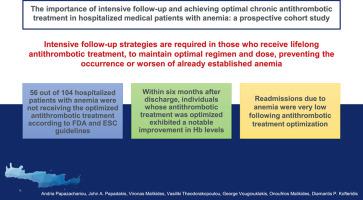Hellenic Journal of Cardiology ( IF 4.1 ) Pub Date : 2024-01-03 , DOI: 10.1016/j.hjc.2023.12.006 Andria Papazachariou , John A. Papadakis , Vironas Malikides , Vasiliki Theodorakopoulou , George Vougiouklakis , Onoufrios Malikides , Diamantis P. Kofteridis

|
Background
Anemia is a global health concern, particularly among the elderly on chronic antithrombotic treatment. Close monitoring of hemoglobin (Hb) levels and achievement of an optimized treatment significantly enhance patient’s quality of life. This study aimed to examine the impact of antithrombotic treatment on Hb levels and readmissions in hospitalized patients with anemia.
Methods
This is a prospective cohort study of patients admitted to the Department of Internal Medicine of the University Hospital of Heraklion, Greece, from November 2021 to October 2022 with the diagnosis of anemia while receiving antithrombotic treatment. Data regarding demographics, past medical history, laboratory and endoscopy findings were recorded. For those receiving inappropriate therapy according to international guidelines, antithrombotic treatment was optimized. Subsequent follow-ups occurred at one and six months post-discharge. Six- and twelve-month anemia-caused-readmissions, as well as annual mortality were evaluated.
Results
In total, 104 patients were assessed. Among them, 34.6% were on antiplatelets, 56.7% were on anticoagulants, and 8.7% were on combination treatment. The mean age was 80±8.2 years and 54.8% were males. On admission, mean Hb levels were 6.86±1.23g/dL, while 56 (53.8%) patients had severe anemia. Gastroscopy and colonoscopy were performed in 75.0% and 41.4% of patients, respectively, confirming gastrointestinal bleeding in most of the cases. Treatment optimization was carried out for 56 patients. Follow-up revealed elevated Hb levels after one and six months post-discharge, while anemia-related readmissions stayed below 10%.
Conclusions
Most hospitalized anemic patients on antithrombotic treatment had endoscopic findings favoring gastrointestinal bleeding. Half received inappropriate antithrombotic therapy. Treatment optimization and regular follow-up improved Hb levels and reduced readmissions.
中文翻译:

对贫血住院患者进行强化随访和实现最佳慢性抗血栓治疗的重要性:一项前瞻性队列研究
背景
贫血是一个全球性的健康问题,特别是在接受长期抗血栓治疗的老年人中。密切监测血红蛋白 (Hb) 水平和实现优化治疗可显着提高患者的生活质量。本研究旨在探讨抗血栓治疗对贫血住院患者血红蛋白水平和再入院的影响。
方法
这是一项前瞻性队列研究,研究对象为 2021 年 11 月至 2022 年 10 月入住希腊伊拉克利翁大学医院内科的患者,这些患者在接受抗血栓治疗时被诊断为贫血。记录有关人口统计、既往病史、实验室和内窥镜检查结果的数据。对于那些根据国际指南接受不适当治疗的患者,优化了抗血栓治疗。随后的随访发生在出院后 1 个月和 6 个月。对六个月和十二个月贫血引起的再入院以及年度死亡率进行了评估。
结果
总共有 104 名患者接受了评估。其中,34.6%接受抗血小板治疗,56.7%接受抗凝治疗,8.7%接受联合治疗。平均年龄为80±8.2岁,其中54.8%为男性。入院时,平均血红蛋白水平为 6.86±1.23g/dL,而 56 名患者(53.8%)患有严重贫血。分别有75.0%和41.4%的患者进行了胃镜检查和结肠镜检查,大多数病例证实有消化道出血。对 56 名患者进行了治疗优化。随访显示出院后 1 个月和 6 个月后 Hb 水平升高,而贫血相关的再入院率保持在 10% 以下。
结论
大多数接受抗血栓治疗的住院贫血患者的内镜检查结果显示有消化道出血。一半接受了不适当的抗血栓治疗。治疗优化和定期随访改善了血红蛋白水平并减少了再入院率。



























 京公网安备 11010802027423号
京公网安备 11010802027423号